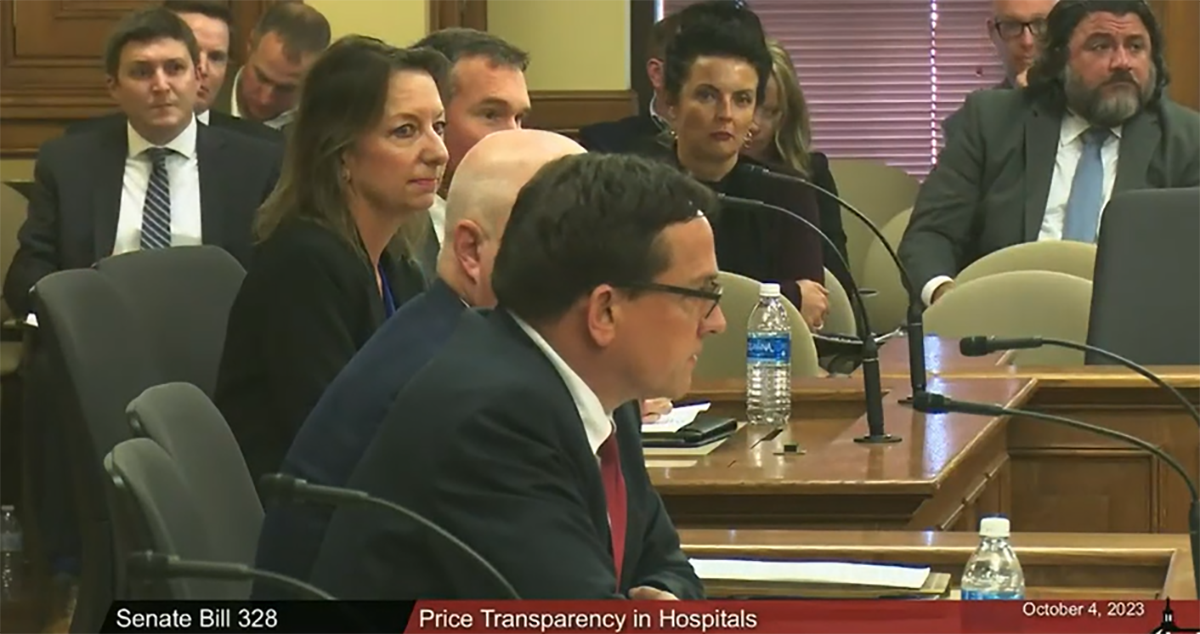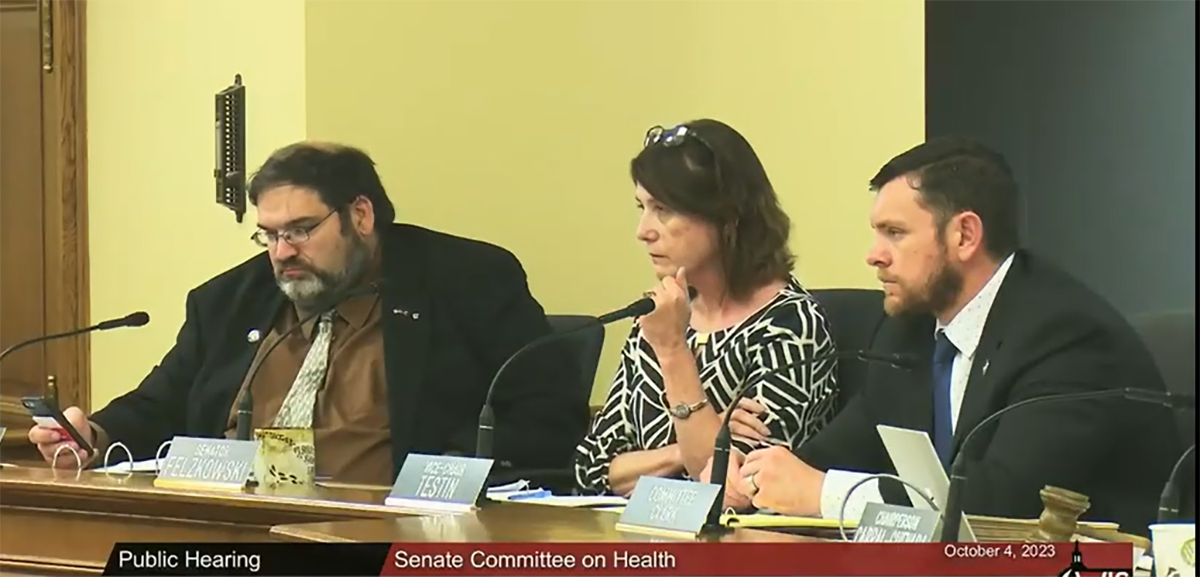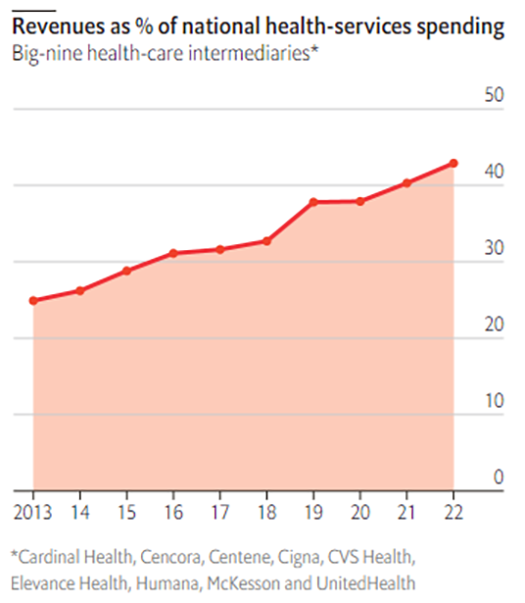In a public hearing before the Senate Health Committee on Oct. 4, WHA President and CEO Eric Borgerding was joined by Senior Vice President of Finance and Chief Operating Officer Brian Potter and nearly a dozen hospital representatives to testify against Senate Bill 328, legislation that would create unnecessary state-level regulations onto Wisconsin hospitals that are already spending significant human and financial resources to comply with federal price transparency regulations.
 Eric Borgerding
Eric Borgerding
“Understanding this issue of enforcement and compliance is important because for about a year now, it’s been stated that Wisconsin needs legislation like SB 328 because, it’s been said, that its easier for hospitals to ‘just pay the fines’ than to comply with the law,” said Borgerding. “It has been stated as fact that hospitals are paying their fines and walking away from the federal transparency law. This is completely inaccurate. Again, not one Wisconsin hospital has been fined by CMS.”
While proponents for this legislation once argued that hospitals are simply avoiding compliance by paying fines to CMS, the arguments by some have now pivoted to portray that enforcement by CMS is lacking.
Borgerding continued, “Since no Wisconsin hospital has been fined to date, it is now said that we need legislation like SB 328 because enforcement of the law by CMS is ‘almost entirely non-existent.’ As of June 27, CMS had issued 906 warning letters to hospitals and required 371 corrective action plans. After a comprehensive compliance review, over 300 hospitals were determined by CMS to not require any compliance action and another 457 addressed deficiencies and received a review closure notice from CMS. Contrary to claims, hospitals do not just ‘walk away’ from CMS letters, nor have we in Wisconsin…”
Questions by committee members to the bill’s authors focused largely on why hospitals were singled out in this legislation, even though federal price transparency regulations exist for hospitals, health insurance companies and self-funded employers. Additionally, the only publicly available data regarding enforcement of federal regulations pertains to hospital compliance.
 Members of the Senate Health Committee Sen. Andre Jacque, Sen. Mary Felzkowski and Sen. Patrick Testin
Members of the Senate Health Committee Sen. Andre Jacque, Sen. Mary Felzkowski and Sen. Patrick Testin
“Do you believe that there is greater compliance by insurance companies or self-funded employers than hospitals right now?” asked Senator Andre Jacque to Senator Mary Felzkowski (R-Irma) and Senator Julian Bradley (R-Franklin), the bill’s authors. The authors responded by saying that they did not know the answer.
While the bill’s authors cited the number of forfeitures as a barometer for CMS enforcement, Senator Jacque stated that government’s goal should not be to fine regulated entities but to bring entities into compliance with the regulation.
CMS has been actively soliciting complaints from consumers and patients who feel that hospitals are not complying with federal price transparency requirements. When circulating this legislation in May, the bill’s authors wrote to their legislative colleagues that CMS enforcement is “almost entirely nonexistent.” Yet, in their testimony, hospitals discussed warning letters that their organization(s) have received to correct what CMS perceived as errors. Every hospital that testified said that they quickly worked to make changes that CMS said would result in compliance with federal regulations.
Senator Jacque asked the bill’s authors if they are aware of any complaints filed by patients or consumers that CMS has not followed-up on.
“That I don’t know, Senator,” responded Felzkowski.
In his testimony, Borgerding went on to discuss the administrative and regulatory burden placed on hospitals when states decided to create state-level regulations on top of existing federal regulations, citing that this is the exact opposite direction of legislation enacted in 2014 and authored by then-Representative Howard Marklein and State Senator Leah Vukmir to streamline Wisconsin’s state hospital regulations (DHS 124) with the federal Medicare Conditions of Participations (CoP).
“Hospitals do all this while operating in an environment of shrinking reimbursement, skyrocketing labor, drug and supply costs, and growing amounts of federal, state and payer bureaucracy, including never ending and ever-changing requirements for data and information from an expanding universe of middlemen that occupy more and more of the space between patients and their providers,” said Borgerding in his testimony.
 Source: “Who profits from America’s baffling health care system?”, The Economist, Oct. 8, 2023.
Source: “Who profits from America’s baffling health care system?”, The Economist, Oct. 8, 2023.
Just this past week,
The Economist published a story
“Who profits from America’s baffling health care system?” citing data that the national health care spend on “the middlemen” (i.e. insurers, chemists, drug distributors and pharmacy benefit managers) has increased from 25% in 2013 to nearly 45% in 2022.
“Aside from the “why” for this legislation, let me address the “how” of this legislation, and the burden of complying with an additional set of state rules, deadlines, fines, and definitions on top and different from what federal law already requires,” stated Borgerding. “This bill does not mimic federal law and will add administrative cost to what most acknowledge is a system that is far too costly, too complex and too filled with regulatory and administrative hurdles that drain resources from patients’ care.”
Since this legislation was introduced in June just three months ago, CMS has already proposed updates to its federal regulations that make Senate Bill 328 conflict even more with existing and proposed new federal requirements. Senate Bill 328 hasn’t even passed the legislature yet and it’s already outdated.
WHA extends appreciation to its many members who have called their elected officials asking for opposition to this legislation and particularly thanks leaders from Door County Medical Center, Aurora Health Care, Prairie Ridge Health, Aspirus Health, Bellin Health and Gundersen Health System, and SSM Health for testifying alongside WHA in opposition in Committee last week.
WHA will continue to aggressively advocate against passage of Senate Bill 328.